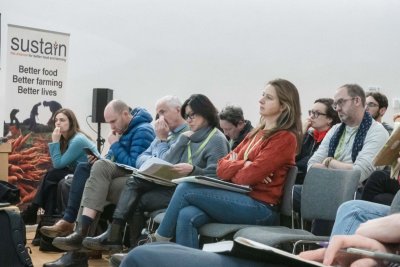Sustain: Sustain The alliance for better food and farming advocates food and agriculture policies and practices that enhance the health and welfare of people and animals, improve the working and living environment, enrich society and culture and promote equity.

Pesticide companies' own tests reveal serious bee harm from neonics
Unpublished data from Syngenta and Bayer shows that their products cause serious harm to honeybee colonies, leading scientists to call for field trial results to be routinely made public
The test results were obtained by Greenpeace from the US Environmental Protection Agency after a Freedom of Information request. They show that two neonicotinoid-based pesticides made by the companies seriously harmed colonies at high doses, although they did not find significant effects at low concentrations.
According to the report in Euractiv (available here), Syngenta had told Greenpeace in August that 'none of the studies Syngenta has undertaken or commissioned for use by regulatory agencies have shown damages to the health of bee colonies'.
Exposure of the unpublished data led UK bee expert Professor Dave Gouldson to call for all such research to be made public: 'Given all the debate about this subject, it is hard to see why the companies don’t make these kinds of studies available.'
Neonicotinoids are the world’s most widely used insecticides. There is clear scientific evidence that they harm bees at the levels found in fields, though only a little to date showing they harm bee colonies. Neonicotinoids were banned from use on flowering crops in the EU in 2013, despite opposition from some UK voices.
Read more about Sustain's work on food and agriculture policy here.
Sustain
The Green House
244-254 Cambridge Heath Road
London E2 9DA
020 3559 6777
sustain@sustainweb.org
Sustain advocates food and agriculture policies and practices that enhance the health and welfare of people and animals, improve the working and living environment, promote equity and enrich society and culture.
© Sustain 2026
Registered charity (no. 1018643)
Data privacy & cookies
Icons by Icons8







